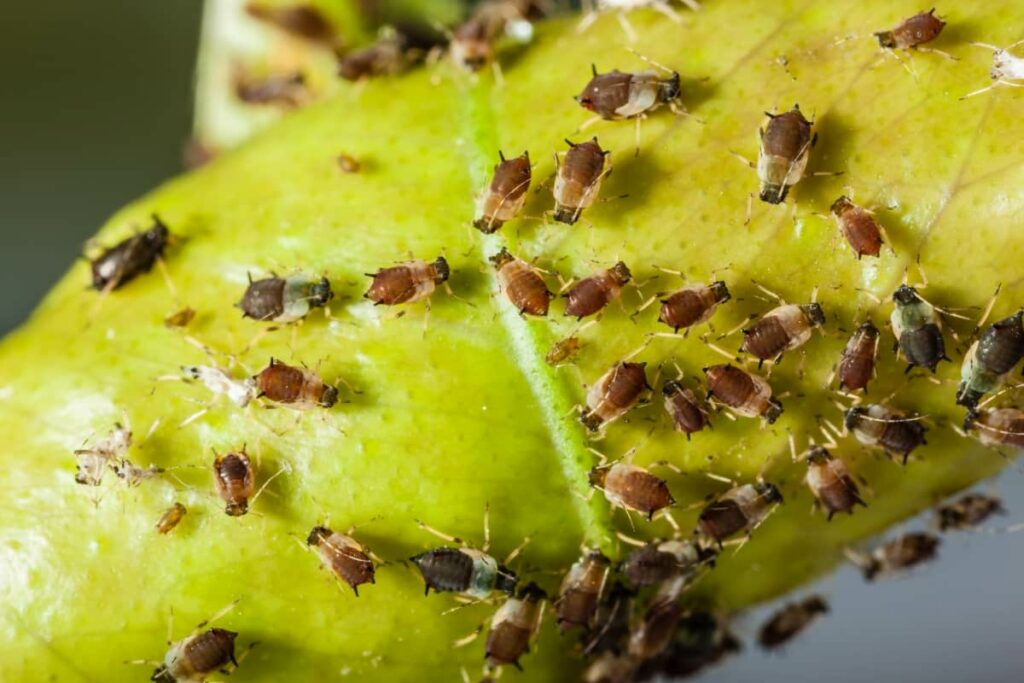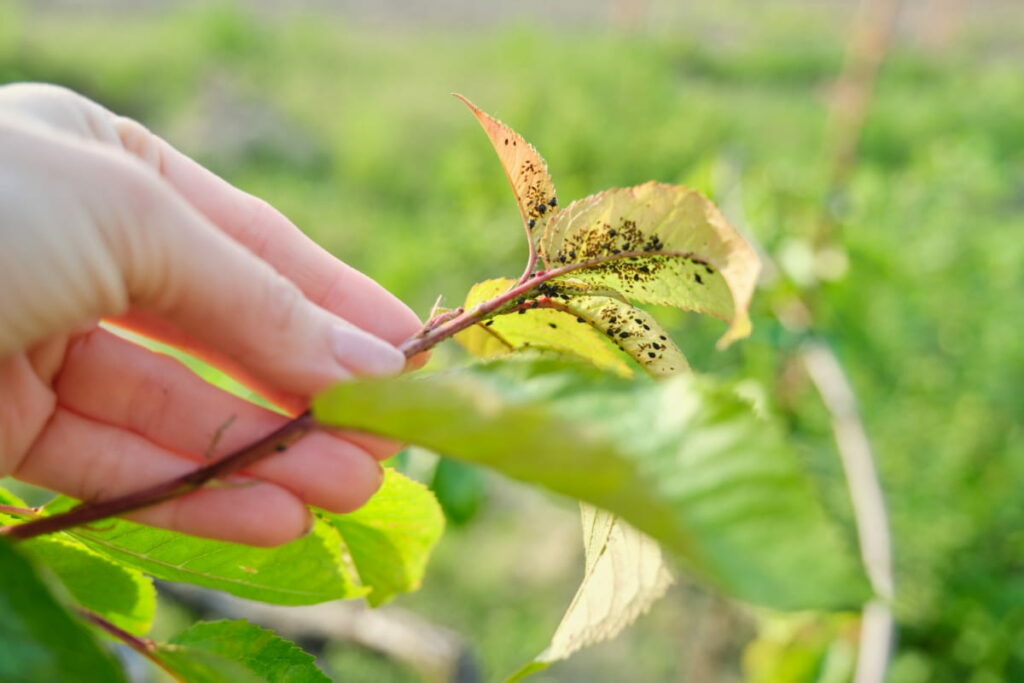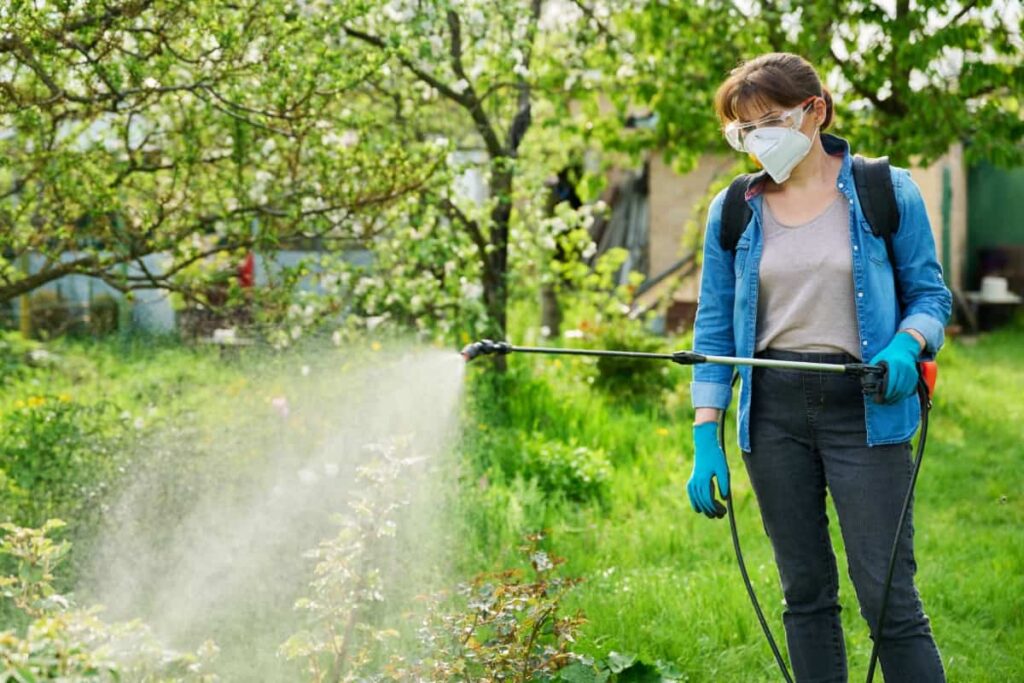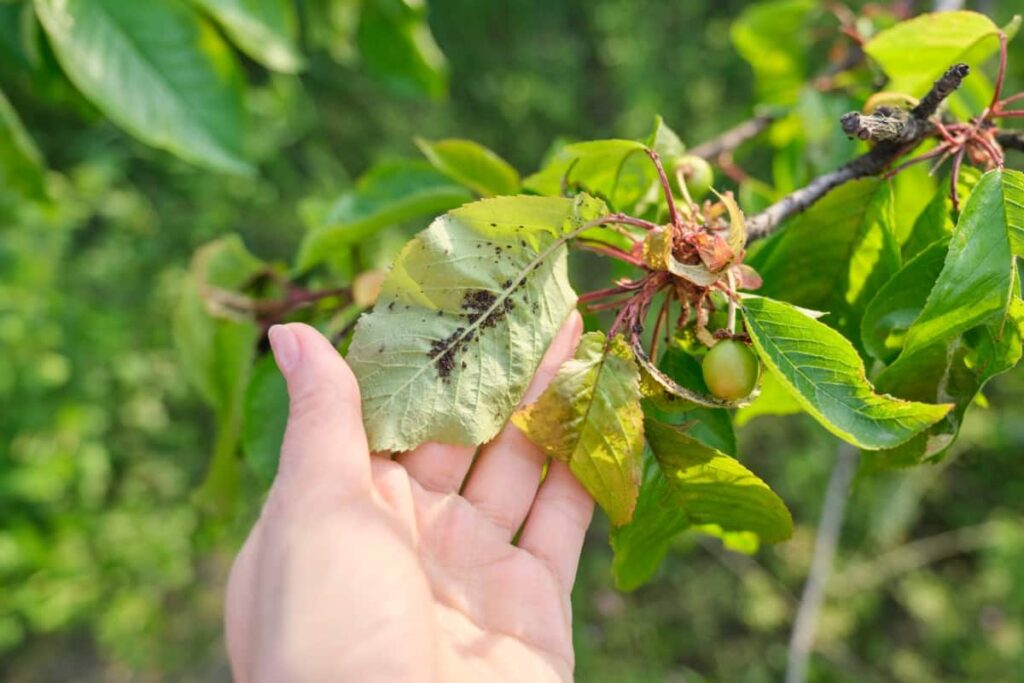In the vibrant tapestry of a garden, aphids emerge as tiny yet formidable foes, threatening the well-being of our cherished plants, especially vegetables. The battle against these sap-sucking invaders necessitates a strategic arsenal of insecticides.

As conscientious gardeners, the quest for the best pesticide for aphids on vegetables leads us down a path where natural, chemical, organic, and systemic insecticides converge. Navigating this realm, we explore the efficacy of natural pesticides for agriculture, dive into the nuances of organic insecticide sprays, and weigh the pros and cons of chemical solutions.
Understand Aphids and Their Impact on Plants
Aphids, diminutive sap-feeding insects, can adversely impact plants, especially vegetables. These minute pests extract sap from plants, resulting in leaf damage and inhibiting overall growth. To effectively combat aphid infestations, it’s crucial to understand their impact on your garden. Aphids reproduce rapidly, and a small population can quickly turn into a full-blown infestation, affecting the overall health of your plants. Recognizing the signs of aphid presence, such as curled leaves and sticky honeydew residue, is essential for timely intervention.
7 Best Insecticides for Aphids on Plants
Natural Insecticides for Aphid Control
When it comes to protecting your plants from aphids, natural insecticides offer a sustainable and eco-friendly solution. Natural pesticides for vegetables and agriculture include various options that effectively control aphids without harming the environment. Neem oil, for instance, is a popular choice known for its ability to disrupt aphid feeding and growth. Garlic spray is another effective natural insecticide for home gardens. These natural solutions not only combat aphids but also contribute to the overall health of your garden, promoting a balanced ecosystem.
Chemical Insecticides for Aphid Infestations
In some cases, a more aggressive approach may be necessary to tackle severe aphid infestations. Chemical insecticides, though not the first choice for eco-conscious gardeners, can be highly effective in controlling aphids. These products often contain synthetic compounds designed to eliminate aphids on contact or through systemic action.
It’s essential to use chemical insecticides with caution, following instructions carefully to minimize environmental impact. While they provide a quick solution, it’s crucial to weigh the potential drawbacks and consider the long-term effects on your garden ecosystem.
Organic Insecticides to Combat Aphids
For those seeking a middle ground between natural and chemical solutions, organic insecticides present a viable option. These products harness the power of natural ingredients while incorporating advanced formulations to enhance effectiveness. Organic insecticide sprays are available for tackling aphids on vegetables, providing a balance between efficacy and environmental consciousness. With ingredients like pyrethrin derived from chrysanthemum flowers, organic insecticides offer a safe and efficient means of aphid control without compromising the health of your plants.
In case you missed it: Aphids Information Details on Plants

Natural Insecticide for Home
Maintaining a pest-free home environment is a priority for many individuals, and natural insecticides play a crucial role in achieving this goal. Natural insecticide for home use often includes ingredients like essential oils, diatomaceous earth, or vinegar. These substances repel or eliminate aphids and other pests without posing risks to pets or family members. Creating homemade pesticides for plants using readily available ingredients is an economical and sustainable way to keep your indoor plants thriving.
Natural Pesticides for Vegetable Garden
In a vegetable garden, the focus shifts to ensuring that the produce is not only free from aphids but also safe for consumption. Natural pesticides for a vegetable garden offer a solution that aligns with this goal. Utilizing neem oil, garlic spray, or companion planting with pest-repelling plants is an effective strategy.
These natural approaches not only protect vegetables from aphids but also contribute to the overall well-being of your garden. By incorporating natural pesticides into your vegetable garden care routine, you can enjoy a bountiful harvest without compromising on safety or sustainability.
Systemic Insecticides for Long-Term Aphid Control
When facing persistent aphid challenges, systemic insecticides prove invaluable for achieving long-term control. These insecticides are designed to be absorbed by the plant, making the entire plant toxic to aphids. This method ensures that aphids feeding on any part of the plant are affected, offering a comprehensive and sustained solution.
In case you missed it: Key Differences Between Natural Farming and Organic Farming: Natural Farming vs Organic Farming

Systemic insecticides often come in the form of granules or drenches applied to the soil, allowing the plant to uptake the insecticide and provide ongoing protection. While effective, it’s essential to exercise caution, especially with edible crops, and adhere to recommended application rates for optimal results.
Contact Insecticides for Immediate Aphid Eradication
When quick action is imperative, contact insecticides stand out for their immediate aphid eradication capabilities. These insecticides deliver rapid results upon direct contact with the pests. Insecticidal soaps, for instance, disrupt the aphids’ cell membranes on contact, leading to swift elimination.
Pyrethrin-based contact insecticides provide a fast knockdown effect, making them suitable for situations where immediate intervention is necessary. While these products offer speedy relief, their impact is short-lived, making them ideal for targeted applications when aphid populations are at their peak.
Non-Toxic Insecticides Safe for Beneficial Insects
Preserving a garden’s ecosystem involves safeguarding beneficial insects while addressing aphid issues. Non-toxic insecticides play a crucial role in achieving this delicate balance. Beneficial insects like ladybugs and parasitic wasps play a crucial role in naturally managing aphid populations.
Non-toxic insecticides, often based on natural ingredients like neem oil or insecticidal soap, selectively target aphids while sparing beneficial insects. This approach allows for integrated pest management, maintaining a harmonious environment where natural predators can thrive alongside your plants.
Best Insecticide Sprays for Aphid Management
Choosing the right insecticide spray is crucial for effective aphid management. Among the array of options, certain sprays stand out as top performers. Neem oil-based sprays, available as natural and organic solutions, provide a potent defense against aphids. Insecticidal soap sprays, made from potassium fatty acids, are another excellent choice, disrupting aphid cell membranes and leading to their demise. Additionally, pyrethrin-based sprays offer quick knockdown of aphid populations. These sprays are easy to apply and offer a convenient method for maintaining a healthy and aphid-free vegetable garden.
Select the Right Insecticide for Different Plant Types
Not all plants respond the same way to insecticides, and selecting the right one for different plant types is essential for effective aphid control. Understanding the specific needs of your plants helps tailor your approach. For instance, certain insecticides may be suitable for ornamental flowers but not recommended for edible herbs.
In case you missed it: Management Strategies for Controlling Black Thrips Life Cycle

Consider the sensitivity of your plants and choose insecticides that align with their requirements. This approach ensures that aphids are effectively targeted without compromising the health of your diverse garden flora. Always refer to product labels for guidance on compatibility with specific plant types.
Conclusion
From natural insecticides for vegetables to chemical interventions for severe infestations, our journey explored the nuances of organic sprays and systemic solutions for sustained control. Contact insecticides provided swift eradication, while non-toxic options safeguarded beneficial insects.
The choice of the right insecticide for different plant types emerged as a pivotal consideration in the pursuit of a thriving garden. As we conclude this exploration, armed with knowledge, we stand poised to make informed decisions, preserving the delicate balance of our garden ecosystems. May our plants flourish, free from the grasp of aphids, as we continue to cultivate a greener, healthier world.
- Aquaponic Farming at Home: A Step-By-Step Guide
- Profitable Village Farming Business Ideas in 2024
- High-Yield Aquaculture: Fast-Growing Fish for Farming
- Effective Fish Pond Construction Techniques for Beginners
- Irrigation and Water Management in Pineapple Farming
- Blossom to Harvest: Mastering Flowering and Pollination in Papaya Farming
- Pig Fattening Essentials: From Selection to Sale for Beginners
- Raising Wagyu Cattle: A Complete Guide for Premium Beef Production
- Soil Types and Their Water Holding Capacity
